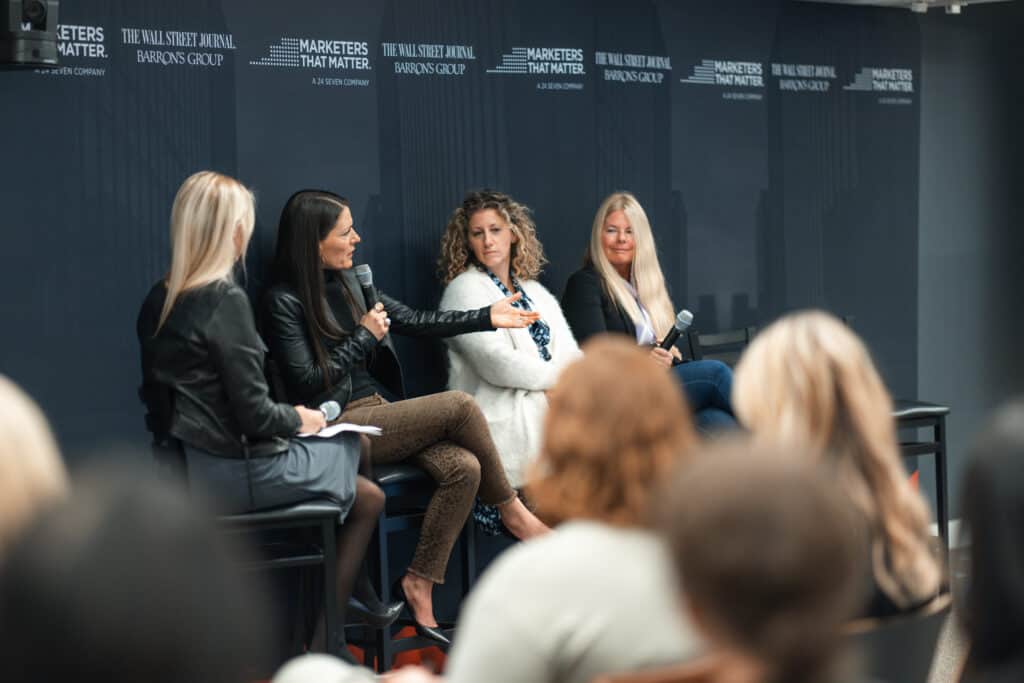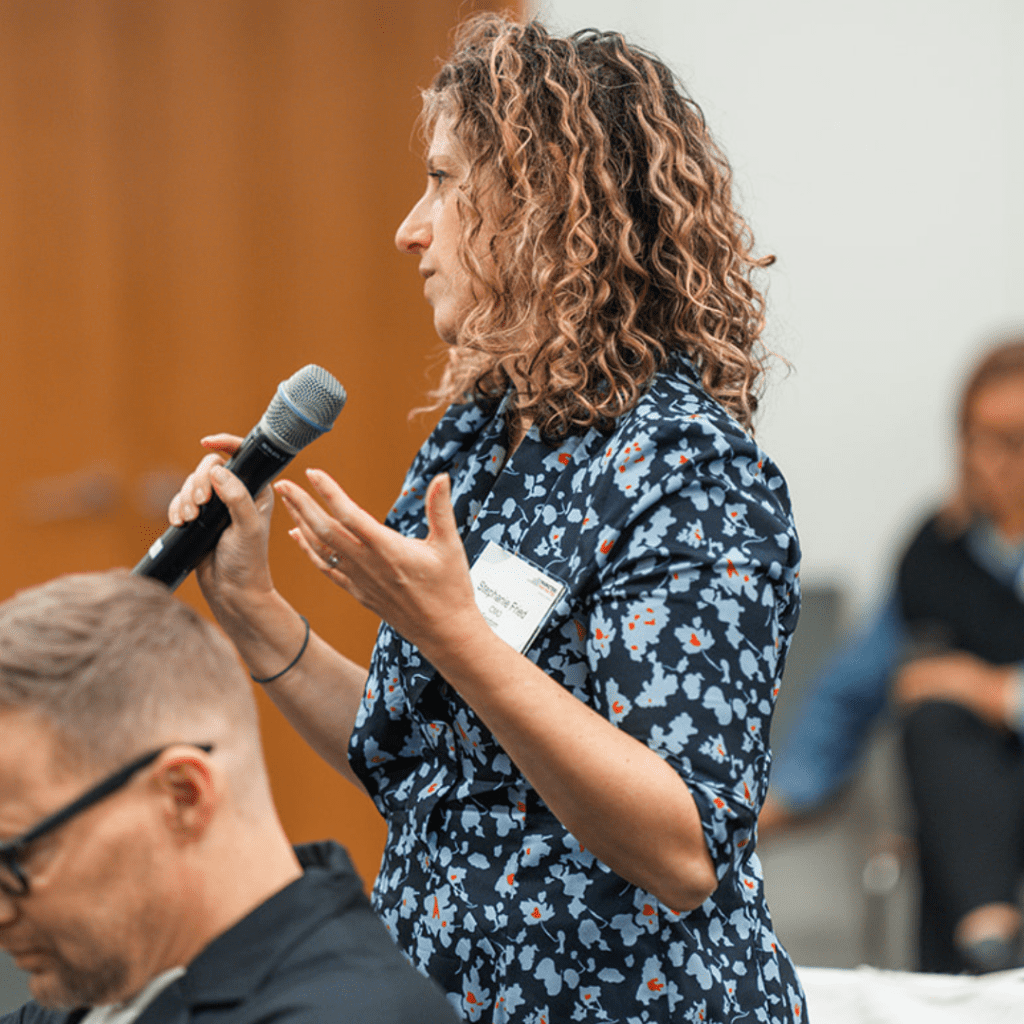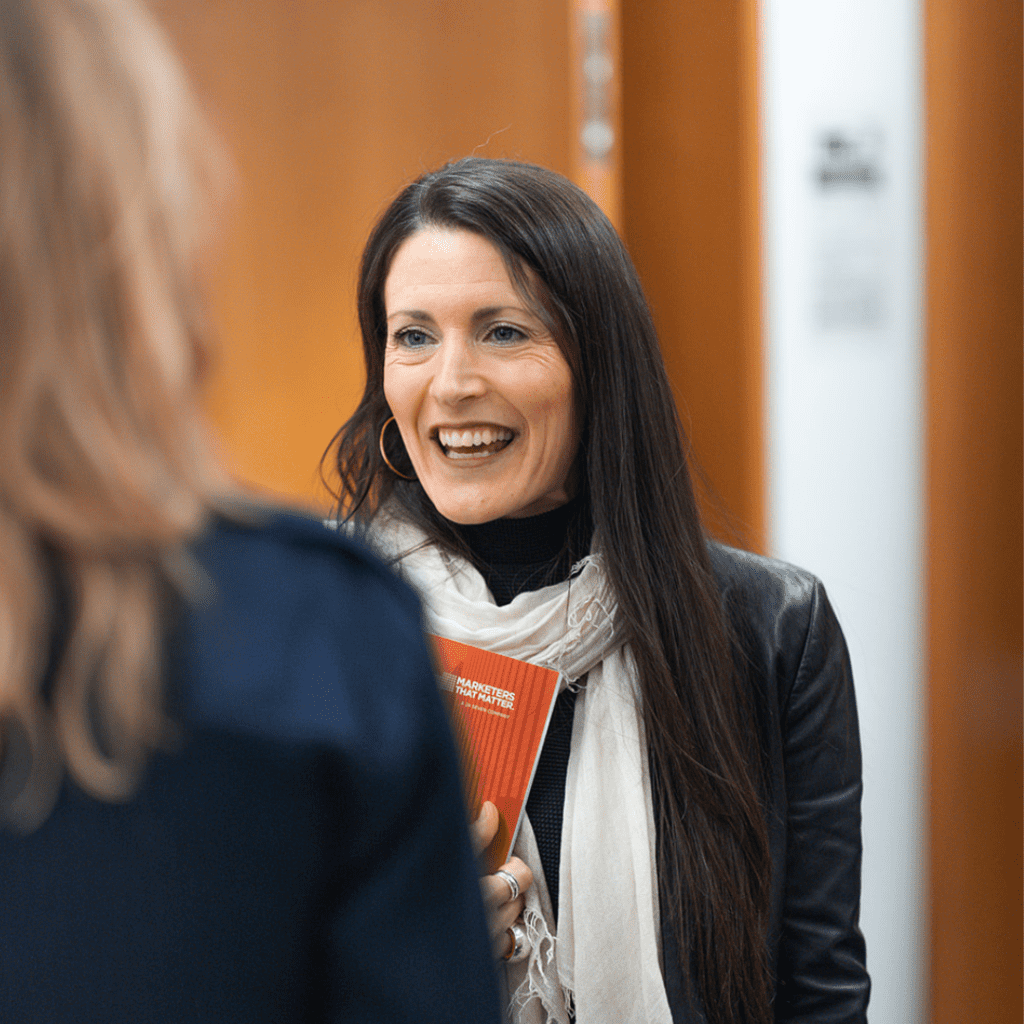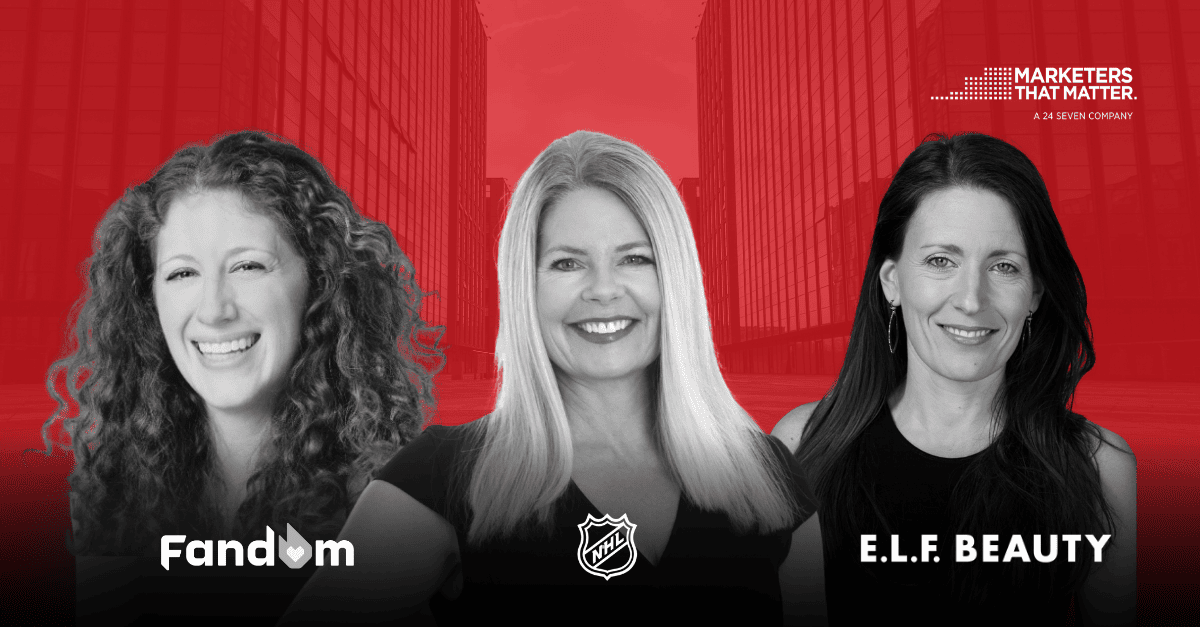For many organizations, fans are the foundation of their business. Every company knows how to market to its fans, but the most successful organizations know that engaging with fans both directly and indirectly is key. In both the aftermath of the pandemic and the explosive tidal wave of existing and new social media channels, catering to fans is a whole new stage where marketers empower their fans to lead the conversation.
At a recent Marketers That Matter Summit, we gathered three top marketing executives who have tapped into the power of fans to keep their organizations thriving, even in the face of an unpredictable past few years.

Led by moderator Meg Wubbenhorst, SVP of Marketers That Matter, and joined by guests Heidi Browning, CMO at NHL, Stephanie Fried, CMO at Fandom, and Kory Marchisotto, CMO of e.l.f. Beauty. While all the panelists come from varying industries, the commonality of fan engagement has proven to be a pillar of their success.
Overview
- Seizing the Moment to Pivot
- Striving for Authenticity
- Seeing Employees as People
- Key Takeaways
Seizing the Moment to Pivot
How has the pandemic changed how your brand interacts with fans?

Stephanie Fried: When the pandemic started, everyone was engaging with media for hours a day. Our traffic went crazy during that time, which was great for our business but sad for the world. We wanted to think about why consumers were coming to us. Throughout the pandemic, we saw how quickly people’s interests changed. The three biggest content trends were plagues, nostalgia, and escapism. For example, people rewatched Friends, Gilmore Girls, and other shows that helped remind them of times out with friends and family.
We strived to create a place where people could feel more connected via their fandoms and entertainment. People were coming to us, and we wanted to give back and serve those fans by giving them something to help their well-being. We launched six initiatives in six weeks, a mix of live and interactive programming to give fans the chance to participate and connect with active fan communities and creators.

Heidi Browning: Many of the lessons we’ve learned from the pandemic are reflections of what we’ve learned from listening to our Youth Advisory Board, now called the NHL Power Players. This initiative was inspired by a young girl who presented her ideas to a group of our organization’s marketers. When she presented, we had an “ah ha!” moment. We were already doing many of these ideas, yet they weren’t reaching her. We weren’t in the right places or communicating in the right way. Now, twice a month, we meet with 27 young people, ages 13-17, and have conversations while watching games.
One of the most prominent insights we have gained from the NHL Power Players is the notion of “See Me,” which is about younger generations being acknowledged or recognized on social media. Whether it’s a retweet or a share, it means everything to them. “Seeing them” is a form of social currency. During the pandemic, when no athletes were on the ice, we had to retain our fans without any product. So, we turned the spotlight on our fans. We engaged with them much more extensively, creating this connective tissue. The “See Me” concept is also significant within our organization. As CMOs and leaders, we are obligated to celebrate our fans and our teams.

Kory Marchisotto: We entered the pandemic with Tiger King and exited with Ted Lasso—a journey from crass to kind. For organizations, that means wearing your heart on your sleeve and turning your company inside out.
"We entered the pandemic with Tiger King and exited with Ted Lasso—a journey from crass to kind." Kory Marchisotto, CMO, e.l.f Beauty Share on XDuring the pandemic, our consumers needed something very different from us. They didn’t just want to know about our products; they wanted to know about our people. They needed to know who our CEO was, what he cared about, and the makeup of our company in terms of diversity. We shifted from selling products to selling values.
During a crisis, you need to think: What is happening with our consumers today? What do they need from me? How can I deliver it to them? And then, we use the platform we have to make a positive impact on people’s lives. We became a safe place where people come when they need to have conversations about social justice, and we became a Gen Z favorite through the bravery, courage, and kindheartedness we led with. Then, we met the moment and we met people where they were. And we didn’t see them just as consumers. You need to talk to people’s hearts and get to know the depths of their souls. They’re smart, they’re savvy, and they care. Social media has changed everything. The pandemic turned the dial up on humanity.
Striving for Authenticity
Why do values matter when you’re building company culture?

Stephanie Fried: Company culture is important, but people never ask about the values of our organization. How are these values present in everything we do? We workshopped with our executive team to ensure the value buzzwords aren’t just there but truly integrated into the company. It becomes authentic when your organization’s actions are grounded in something you truly believe in. When that happens, everything becomes more meaningful for your fans.

Kory Marchisotto: The most important aspect of values is that they are seen in an organization’s behaviors. Inauthenticity comes up when the values don’t match the behaviors. For example, our CEO always comes to us and asks what we care about. This action says everything about our values. You have to ask yourselves: What are the actions of our leaders? What are the gestures of care? What are the moments of empathy? Often you put up those value buzzwords, but they don’t mirror how people behave. Instead, the actions should mirror your values. Start with what you care about first.
Seeing Employees as People
In one sentence, how do you turn employees into fans?
Heidi Browning: Turning employees into fans is all about seeing them. Employees must feel seen and respected in every aspect of their lives, from their work to who they are.
"Turning employees into fans is all about seeing them. Employees must feel seen and respected in every aspect of their lives, from their work to who they are." -Heidi Browning, CMO at NHL Share on XStephanie Fried: It’s not only about seeing employees, but asking them what they think. The best marketing ideas have come from people outside of marketing. We look for input across the organization. When you do this, you get different ideas from different places, angles, and perspectives. Listen, ask, and build together.
"The best marketing ideas have come from people outside of marketing." – Stephanie Fried, CMO at Fandom Share on XKory Marchisotto: See your employees, invite them in, and be a mirror image of what’s inside your community’s heart.
"See your employees, invite them in, and be a mirror image of what’s inside your community’s heart." – Kory Marchisotto, CMO of e.l.f. Beauty Share on XKey Takeaways
Cultivating a dedicated fanbase starts from the inside of the organization itself. Fans are conscious and intentional consumers. When a company is genuinely dedicated to its employees and its values, consumers see this and are more likely to become loyal fans. The pairing of the pandemic and rise in social media has fundamentally changed the dynamics of marketing. Now more than ever, the consumer paves the way. Good ideas may come from the boardroom, but many come from the living room too.
_______________________________________________
Moderated by Meg Wubbenhorst, SVP of Marketers That Matter: Meg Wubbenhorst is a versatile strategic marketing leader with 20+ years of experience collaborating with partners to build and deliver a vision – understanding the consumer insights, setting the KPIs and goals, and then managing the project plan and driving the initiative forward for key stakeholders. She leads a community of global Chief Marketing Officers from some of the biggest brands in the world. In her role at Marketers That Matter, she seeks to understand CMO’s needs and challenges, build relationships and engagement, and work with executives on industry initiatives (e.g. Diversity-Equity-Inclusion-Belonging, Sustainability, Brand Equity) that are a force for good and a force for growth.
Heidi Browning, CMO at NHL: With over 25 years of marketing experience, Heidi Browning brings a valuable mix of client, agency, and media owner perspectives to the NHL. She is known as a passionate pioneer in digital, mobile, and social marketing and continues to drive thought leadership and innovation within the industry. Inspired by the intersection of media, technology, and culture, Browning studies generational trends in consumer attention and brand engagement. Heidi is responsible for executing the League’s growth marketing strategy with a focus on social media, digital, data, and innovation. She has been recognized as one of the “Most Powerful Women in Sports” by both Forbes and Adweek, by Forbes as one of the Most Influential CMOs in the world, and by Crain’s as one of the Notable Women in the Business of Sports. To hear Heidi share about the Power of Listening, check out her episode on Visionaries.
Stephanie Fried, CMO at Fandom: Stephanie Fried is a marketer with deep roots in analytics and insights and has spent 20 years building and leading the most innovative marketing and research teams in media. Transforming businesses is her passion, and she is known for accelerating growth for a bleeding edge business or re-energizing and reinvigorating a legacy business. Her mantra is, “with a deep understanding of consumer needs, market trends, and the competitive landscape, we can uncover, test, and prove new and exciting paths to growth.”
Kory Marchisotto, CMO of e.l.f. Beauty: Kory Marchisotto is recognized for cultivating partnerships and building lasting relationships across the beauty and fashion industries, including executive-level communications within global organizations. She is an accomplished executive with progressive experience leading digital and traditional marketing strategies with a keen ability to steer brand vision, establish innovative programs, and create effective team development. At e.l.f. Beauty, she leads an accomplished team, and in 2022, her brand was rated #1 in a Piper Sandler survey for Teen’s Top Cosmetic Brand. Check out Kory’s Visionaries episode on Exploring the Gen Z Revolution!
Marketers That Matter® is a community of top marketing executives coming together to pioneer the future of marketing, sharing real-time experiences, and solving current challenges.
Our parent company, 24 Seven, specializes in helping you find exceptional marketing and creative talent for your teams.


